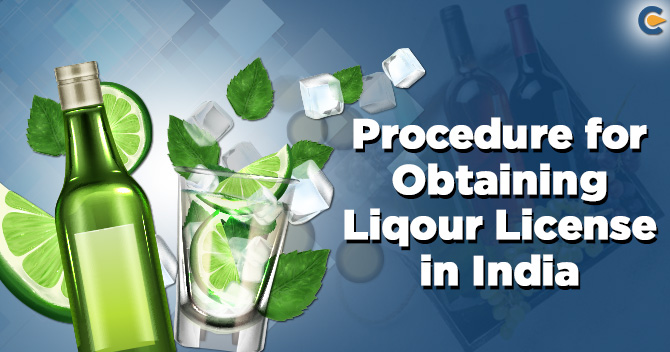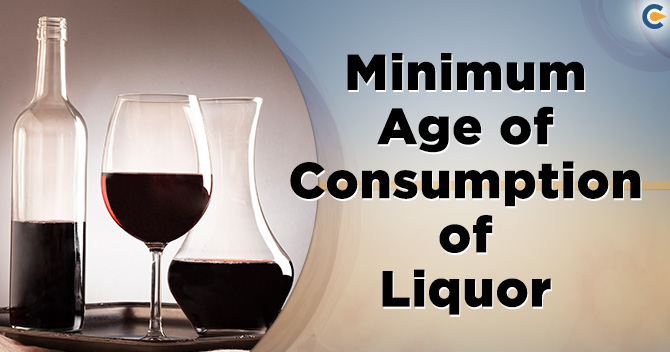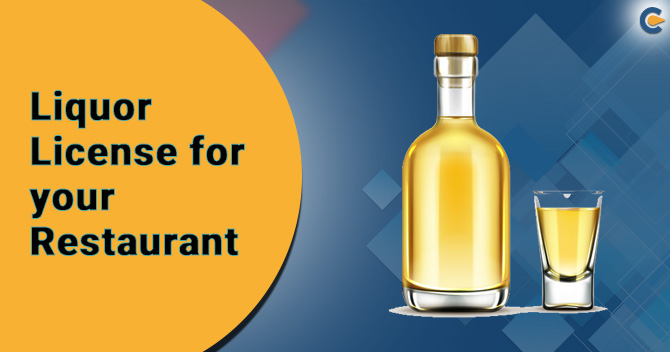In order to sell alcohol, one needs to procure a liquor license in India. Usually, liquor stores, pubs, clubs, discos, bars, hotels, and restaurants own a license to sell alcohol. So, the sellers are required to hold a liquor license to sell alcohol. Otherwise, the selling of alcohol is illegal and prohibited until registration for a liquor license is done.
The liquor license in India for online selling of liquor is also mandatory and can be acquired from the Excise Department of the State Government. Thus, in simple legal terms, a liquor license can be defined as a license granted by the state excise department to anyone who wishes to indulge in the manufacturing, import, export, transport, possession, purchase and selling of liquor and other alcoholic beverages.
Liquor license regulations


Classification of Liquor License in India
While many of the Indian States grant a single liquor license for various kinds and classes of alcohol, in some states, an application for a grant of license of a specific class is required. Therefore in states where a permit is required for different classes of alcohol.
The different set of general liquor licenses available in India are as follows:-
- Beer and Wine License
The Beer and Wine License are for those who are wishing to sell soft and mild liquors like beers and wine. When a Beer and Wine License are obtained, there is a prohibition upon the license holder to deal with any kind of hard liquor.
- Restaurant Liquor License
The Restaurant Liquor License is for restaurants that are willing and wish to serve alcohol on their premises. This type of license is also called the “All-Liquor License.” However, this type of license is only granted to restaurants whose business is mainly generated from the sale of food items, and only a percentage (not exceeding 40%) of sales come from liquor.
- Tavern Liquor License
This type of license is granted to businesses, which in spite of offering food items make up half of their profits out of the alcohol sale.
- Brewpub Liquor License
As the name suggests, this type of license is granted to those who make/ brew their wine and beer.
What is the need to obtain a Liquor License in India?
A Liquor License is granted by the State Excise Department to those who wish to sell and distribute alcohol and alcoholic beverages. Thus, if any person is involved or planning to venture in a business that deals with the sale/distribution or manufacturing of alcohol and alcoholic drinks, then they must apply for a Liquor License.
Every state government keeps a stringent check on the sale and consumption of alcohol sold within its territory, every State has a different set of liquor laws that must be carefully observed before applying for a Liquor License. Moreover, since dealing with the manufacture, import, export, transport, possession, purchase, sale, etc., of liquor is made punishable in the absence of a Liquor License, it is mandatory for one to obtain a valid Liquor License in India accordance with the state laws.
The Ambit of a Liquor License in India
Depending upon the legislation and laws of each state, a valid liquor license in India covers a wide ambit in relation to the manufacture, import, export, transport, possession, purchase, sale, etc., of liquor. Thus a liquor license granted by the state excise department is applicable to not only to the businesses/entity involved in selling alcohol, but it also caters to few considered subjects.
Those are as follows:-


Liquor License cost in India
As stated above, since liquor laws vary from state to state, the cost of a liquor license also varies from state to state. Depending upon the type of Liquor License granted and the event for which it is granted, the following are the average costs that are incurred in obtaining a Liquor License:
- Temporary Liquor License Cost
In case liquor is to be served at an event/party or a marriage organized in a small town, with a population below twenty lakhs, the temporary liquor license will cost somewhere around Rs.10,000 for more than 100 members and Rs. 7,000 for less than 100 members.
- Liquor License cost for a Party in a Private Resort or Flat
As per the excise department, the FL 4 license is required for bringing in liquor in a party organized in a resort or a private flat. The average cost of an FL 4 license is Rs. 13,000.
- Serving Liquor License Cost in the Permit Rooms
The Liquor License cost for serving in permit rooms is Rs.5, 44,000 and that for a restaurant or beer shop is Rs. 1, 50,000.
- Liquor License cost for a particular State
For obtaining a Liquor License in a particular state, the applicant is required to submit an application fee along with the relevant application form. The license fee attached ranges from Rs. 5000 to Rs. 15000 or more depending upon the prevailing state laws and regulations.
How to apply for a Liquor License in India?
As each state in India has its own set of liquor laws, rules, and regulations, it is important to have full knowledge of the liquor laws prevailing in your state before applying for a liquor license. Since liquor laws of the state are laid down by the State Excise Department, anyone wishing to obtain a liquor license can inquire about the same by:
- Visiting the website of the State Excise Department,
- Physically visiting the licensing authority.
- Physically visiting nearby liquor shops.
After having a fair idea about the prevailing liquor laws, rules, and regulations of the state, one can decide the type and class of license which need to apply for.
The general classes of license include:
- Beer and Wine License
- Restaurant Liquor License
- Tavern Liquor License
- Brewpub Liquor License
Laws that Regulate Liquor Consumption in India
In India, any establishment that serves alcohol must have a valid liquor license. Liquor consumption, manufacturing, and distribution are issues pertaining to the state list as per the seventh schedule of the Indian constitution. This is why each state has its own liquor laws. Even for registration of foreign liquor bar licenses, every government regulates alcohol sales to prevent minors from purchasing spirits, wine, beer, and liquor. For instance, the requirement for a liquor license varies in small towns where they often only approve a new license when the population grows.
According to the Licensing Act 2003[1], one needs a liquor license in India for selling the alcohol. This includes giving away free alcohol as it is considered an incentive to purchase or that it is included in your pricing structure. Before starting a liquor business, one has to know about the License or Government regulations and legal things, which are the most important factors before starting the liquor business in India.
Procedure to apply for a Liquor License in India
- STEP 1: Visit the official website of your State Excise Department and download the application form for your preferred license type. Once downloaded, fill in the application form with all necessary details. Once filled, the form must be submitted to the concerned authority along with the required application fee, which varies from state to state. While filling out the form, do remember to mention all the required details, including the type of liquor license required, premises where it needs to be served/sold, type of liquor planning to be served/sold, etc. Also, one must make sure to state your background information like age, business experience, criminal record (if any), etc. along with relevant documents.
- STEP 2: The documents which are required to be attached along with the application form vary from license to license. However, documents like applicant’s identity proof, residence proof, a valid address and/or premise address proof, incorporation certificate (in case of business entities), copy of ITR, etc. are universally required.
- STEP 3: Once the application form is submitted, the state licensing authority will cross-check and verify the credentials submitted by you and can also call for additional documents required.
- STEP 4: Post verification, a notice shall be posted by the concerned state authority on your personal or business address, declaring your name and the license details. The notice so displayed shall be open for any objections raised by the local people, which will be communicated to the concerned department.
- STEP 5: In case an objection is raised, you will be given a right to defend yourself. In case, no objections are raised, the authority will review the application and grant you the Liquor License.
Documents Required for Obtaining a Liquor License
Each state has its own prescribed set of documents that are required for obtaining a liquor license. However, there are certain documents that are needed in general for obtaining a Liquor License. These are:
- Identity Proof of the Applicant
- Address proof of the applicant
- Address proof of the premise used for serving/selling/storing/manufacturing of alcohol
- NOC from the state fire department and municipal corporation
- Application with personal and business details of the applicant
- MOA and AOA copy in case of companies
- Latest ITR copy
- Applicant’s photograph
- An affidavit declaring that there are no past criminal records in the name of the applicant
- An affidavit declaring that there are no pending dues in the name of the applicant.
Revocation of the Liquor License
A Liquor License in India will be liable for revocation if any one of the following acts is committed by the applicant:
- Serving of Liquor on Dry Days
- Serving of Liquors to Minors
- Violations of the rules and laws laid down by the state excise department
Validity and Renewal of License
A Liquor License has a validity of 1 year from the date of issue. After expiry, a liquor license can be renewed annually, by filling the renewal application form available on the website of the State Excise Department and paying the relevant renewal fee.
Therefore, if any person wishes to get his /her license renewed, then they must apply for same before the thirty days from the date of expiry of the license along with the payment of a renewal fee which is fixed by the State Excise Department depending upon the type and/or class of the license. There can be a reduction in the renewal fee, based upon the conduct and goodwill of the applicant.
Guides by the Excise Department
To provide safe and quality liquor to consumers, and to promote responsible drinking in India, the state excise department issues various guidelines from time to time. These guidelines are aimed at raising awareness and ensuring a safe drinking environment. State Excise guidelines include:
- Buying liquor from State authorized liquor shops.
- Granting of the license to a valid and honest taxpayer.
- The use of liquor bought from army canteens must be restricted for personal use.
- Individuals traveling from one state to another must cater to the possession limit for alcohol in each state.
- Do not buy liquor if one has below the legal drinking age.
- Do not service/sell any kind of liquor in an unlicensed premise.
- Every license holder should display a board showing the price of each brand of liquor in case of a liquor shop, menu rate list in case of a restaurant, bar, hotel, or disco.
Conclusion
Liquor is more than just a drink that is served in restaurants, hotels, parties, and functions. It is associated with the complex socio-legal backdrop of a nation. Often associated with crimes and other violent activities, liquor is a sensitive issue to deal with for any state government. This is why in order to regulate and control the manufacturing, production, and selling of liquor and other intoxicants, each state government allots a liquor license in India.
Read our article:How to Get Hookah Lounge License in India? – Process & Fees













